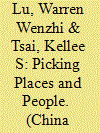| Srl | Item |
| 1 |
ID:
187942


|
|
|
| 2 |
ID:
163425


|
|
|
|
|
| Summary/Abstract |
Urbanization in China involves administrative conversion of rural counties into urban districts. During the 1990s, provincial governments enhanced the authority of county governments by building more direct linkages between the two levels. Yet prefecture-level cities retained direct administrative authority over counties on certain issues. Based on fieldwork and an original database of administrative reorganization cases from 2011 to 2016, the authors observe that vertical competition between provinces and prefecture-level cities is mediating, and in some cases, thwarting the latter’s urbanization efforts. Contrary to the expectation that more developed localities will incorporate wealthier counties, provincial capitals and less developed localities are incorporating counties with the highest fiscal revenue. In developing this argument, this article highlights the neglected role of the provincial government in administrative reorganization and the fiscal implications of urbanization.
|
|
|
|
|
|
|
|
|
|
|
|
|
|
|
|
| 3 |
ID:
183232


|
|
|
|
|
| Summary/Abstract |
China's political system has been characterized by two institutions since the 1980s: an explicit “layer-by-layer administrative hierarchy” and the “appointment of cadres one level down.” There have, however, been two departures from these administrative practices. First, some provinces have “empowered prosperous counties” by placing them in a dual-reporting relationship with both prefecture-level cities and provinces. Second, some provinces have restored personnel control going “two levels down” by appointing key officials at the county and urban district levels of government. These deviations evolved as responses to China's GDP-centric policy environment during the early reform era. Based on field interviews and nationwide analysis of city-level personnel data, this article argues that such adaptations have generated unintended conflicts between provinces and prefecture-level cities. While prior studies of evolutionary change in China highlight the relationship between state and non-state actors, this study demonstrates how interactions among state actors themselves may fundamentally transform the dynamics of administrative governance.
|
|
|
|
|
|
|
|
|
|
|
|
|
|
|
|